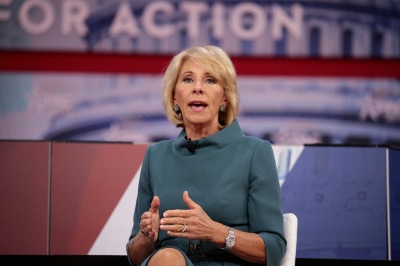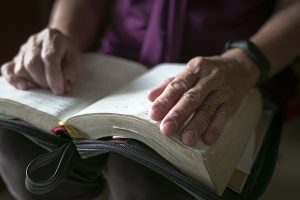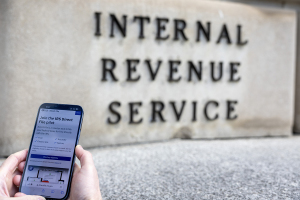Betsy DeVos after 3 years: What Hispanic evangelicals have to say
We all witnessed the greater level of attention given to Senate confirmation hearings at the beginning of President Trump’s tenure.

If you were to ask the average pastor, parent, or schoolteacher to name the Secretary of Education before 2017, hardly any could tell you. It all changed when President Trump selected Betsy DeVos, a wealthy Michigan-based education advocate known for her support of school choice, voucher programs, and charter schools, as the newly inaugurated President Trump’s choice to lead the Department of Education (ED).
Whether the political left was unfair to vehemently oppose Sec. DeVos or whether the political right was correct to receive her so emphatically, is irrelevant to the Hispanic evangelical community that I represent. As the director of the Faith and Education Coalition (FE Coalition) of the National Hispanic Christian Leadership Conference that represents over 40,000 Hispanic evangelical churches, and as a minister with the Assemblies of God’s Texas Louisiana Hispanic District, I can attest that Hispanic evangelicals care about Sec. DeVos and ED’s work particularly in public education. On the three-year anniversary of Sec. DeVos appointment, we evaluate her commitment to promoting access to high quality public education within the Hispanic community.
The FE Coalition recognizes the importance of high-quality public education in the lives of those we represent. Hispanics now make up 26% of public school students (roughly 14 million), up from 16% twenty years ago. Additionally, in 2017 nearly three-quarters of Hispanics (73%) said improving the educational system should be a top priority for President Trump and Congress. We do not ignore the various debates surrounding school-choice or voucher programs, and we wholly support the parents’ right to explore the various educational opportunities available to their children and to choose what’s best. However, we recognize that the vast majority of Hispanic students in America will remain enrolled and continue to enroll in public schools in the coming years.
First, what we should acknowledge is that ED holds little legislative control over what happens in local public schools. Why? Because the Every Student Succeeds Act (ESSA) passed in 2015 with bi-partisan support made substantial changes to its well-known predecessor, the No Child Left Behind (NCLB) Act. Now with ESSA, the majority of the power to develop K-12 standards, accountability systems, and improvement measures shifted from the federal government back to the states. Also, public schools are primarily funded by local and state sources, and, on average, the federal government pays for less than 10 percent of K-12 education.
However, this has not prevented Sec. DeVos from rightly providing direction in areas which she does control and prioritize. For example, Sec. DeVos recently released guidance on constitutionally protected prayer in public elementary and secondary schools, which we saw as a huge win for not only Christians but members of all faith groups. Under the Elementary and Secondary Education Act (ESEA) and ESSA the department is required to revise this guidance every two years. The last update took place eighteen years ago.
Another win for Hispanic Evangelicals includes ED’s and the Department of Justice’s (DOJ) 2017 Title IX guidance for public schools during a time when many questioned how transgender community members should be expected to use public restrooms. Protestants in general (68%) believe gender is determined at birth, and under the new guidance ED and DOJ clarified that the “term ‘sex’ unambiguously refers to biological sex.” Sec. DeVos’ statement reiterated ED’s commitment to ensuring that all students “have the freedom to learn and thrive in a safe and trusted environment” and are protected from harassment. She affirmed that solutions to these types of issues are best solved at the local and state level by the school, communities, and families, and I pray the Lord will grant us the wisdom to offer such remedies that honor God and honor the student.
Despite wins in the realm of conscience, other areas that matter deeply to Hispanic Evangelicals give us reason for much concern. Last year, scores from the National Assessment of Educational Progress (NAEP), “the nation’s report card,” revealed that aggregated 4th grade reading scores across 17 states and 8th grade reading scores across 31 states decreased. In addition to the decline in reading scores for 8th grade Hispanic students, the achievement gap between whites and Hispanics in both grades have shown no signs of improvement over the last 10 years.
These numbers came out under Sec. DeVos’ tenure, but ESSA reminds us that these results are more reflective of local and state level policies rather than her leadership. Also, concerning NAEP, educational experts disagree on what is driving the decrease in reading scores. Some point to education reforms, inadequate and inequitable funding, poverty, even large amounts of time spent in front of computer screens, and the list goes on. Of these experts, none point to Sec. DeVos as a probable cause.
Looking ahead to the remainder of her tenure, we ask Sec. DeVos to focus on promoting high standards in public education and encourage her to make college and career-readiness a top priority to further support Hispanic achievement.
High school graduation is no longer the benchmark for Hispanic K-12 students in America, but if we do not prioritize the implementation of high comparable reading and math standards across states it may stymie Hispanic academic achievement. Only 25% of Hispanic high school graduates meet college-ready standards and then must take remedial courses before they can earn college credit. We continue to urge ED to work with state educational leaders to ensure that an American high school diploma indicates that a student is college- or career-ready. We ask ED to critically evaluate state ESSA plans against standards that are high and rigorous, as well as bold and creative, before approving them.
Additionally, as Hispanic pastors and parents, we would like to know how a school ranks in comparison to other schools in the surrounding area and state. While some might argue that this information will only reveal what we already know about schools relative to zip-codes and a community’s socioeconomic status, the information could equip Hispanic faith leaders and parents to engage as community stakeholders that seek to partner with educators to improve local schools. Sec. DeVos has encouraged the evaluation of K-12 schools through her guidance on how state and local education leaders can ensure parents and caregivers have accurate and accessible information on how their schools are performing. Nonetheless, we ask her to encourage states to go beyond the minimum requirements in report cards and to highlight those whose efforts set the bar high.
Also, our English Learner (EL) population needs attention. The EL population continues to grow, and Hispanics make up more than 75% of ELs nationwide. We encourage DeVos to give increased attention to ELs in K-12 public education. Under Sec. DeVos’s leadership, we have seen some positive steps forward. ED created a data tool that provides a richer understanding of the characteristics and location of ELs across the U.S. In addition, ED allocated $20 million dollars toward the professional development of educators and administrators who provide EL instruction. Still, we ask Sec. DeVos and ED to encourage transparent reporting by states that displays EL educational proficiencies or deficiencies in relation to aggregated scores. Also, in keeping with the spirit of learning, we ask that ELs be held to high and rigorous standards and empowered to achieve college- and career-readiness by graduation. ELs should not be tracked to receive a second-class education.
As the director of the FE Coalition, I try to encourage our ministers to think beyond buzz-word topics such as “evolution vs. creationism,” “sex education,” “bathroom bill,” “school choice” or “common core,” topics worthy of discussion but that often lodge us into some pro-this or pro-that camp and make us hostile to public education. Rather, I work to introduce into our dialogue (and at time give primacy to) issues of “quality” and “readiness,” especially as we evaluate the work of education leaders such as Sec. DeVos or those in our states and cities.
After President Trump’s State of the Union Address, we know that school-choice efforts under Sec. Devos’ leadership show no signs of slowing down. As a Hispanic Evangelical minister who believes all students bear the imago dei, I ask ED to consider how they might be able to grant parents with more than “school choice” but “quality choices.” No student should be without access to a high-quality education, and every school should have the support it needs to offer one.
Forward and higher in Christ.
Rev. Girien R. Salazar is the executive director of the Faith and Education Coalition, an initiative of the National Hispanic Christian Leadership Conference (NHCLC), America’s largest Hispanic Evangelical coalition, that advocates for high-quality education options for all of America's children and promotes Hispanic student achievement in churches and universities. www.faithandeducation.com




























